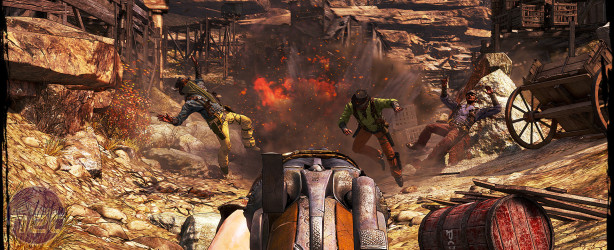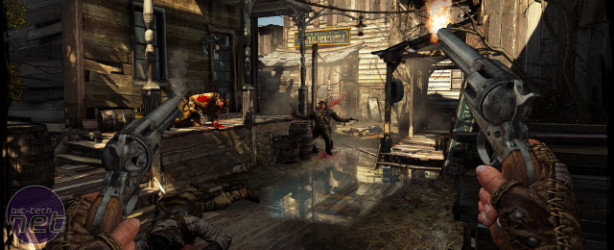
Call of Juarez: Gunslinger preview
Publisher: Ubisoft
Developer: Techland
Platforms: PC, PS3, Xbox 360
It's inevitable that the smaller the budget and design team for a game, the less the title will be able to hit the highest heights of production value and scale. But, what certainly can be done to justify your attention is go for riskier, stranger choices in the writing. After all, words and ideas – even great ones – can be very cheap or even free. It's this path Techland has taken with the latest instalment in the Call of Juarez series.
Call of Juarez: Gunslinger almost completely flips game story telling on its head, with some of the most effective use of the "unreliable narrator" trope we've ever encountered in gaming, with the game constantly responding to and influencing the narrated story as it unfolds.

In other words the game's events aren't necessarily the definite events that transpired in the virtual reality of its setting, instead they're being shaped by the source of the information, the narrator. This is done in a way that not only justifies a lot of the design elements, but it actively has an effect on what happens through the course of your interaction.
You play an aged bounty hunter named Silas Greaves who made a living chasing outlaws in the old west. He walks into a bar and is accosted by a fan who'd read about his exploits in some "penny dreadfuls". The fan buys Silas a beer and a few of the bar's other occupants gather around as a trade for some more insight on his life. Your character then goes on to tell the assembled some of the tales of his exploits, but it's clear that he's actively embellishing a lot of details to make it seem far more exciting than it actually was.

This has great implications for gameplay, where it actively serves to justify the huge numbers of people that your character is shooting down. In other games you'll down a horrendous number of enemies that doesn't seem justified or grounded in reality, here that isn't a concern because it's clear Silas is just trying to make himself live up to his reputation. After all, who's going to say otherwise if his story involves taking down 30 other men without picking up a scratch – he's the only one that would know. He'll even leave in misconceptions that the fan had read about, with you able to play these fantasised sections, then the story reverts back to Silas' original version of events.
What makes this setup particularly interesting, though, is the way the story-telling interplays with the gameplay. Instead of simply playing through this embellished version of events, the game will actually react to the narration.

MSI MPG Velox 100R Chassis Review
October 14 2021 | 15:04









Want to comment? Please log in.